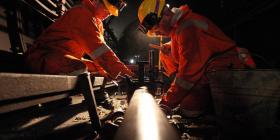Buenaventura Durruti was the ultimate working-class hero: carrying the future in his heart and a gun in each pocket. Abel Paz's magnificent biography resurrects the very soul of Spanish anarchism.
The new, unabridged translation of the definitive biography of Spanish revolutionary and military strategist, Buenaventura Durruti. Abel Paz, who fought alongside Durruti in the Spanish Civil War, has given us much more than an account of a single man’s life. Durruti in the Spanish Revolution is as much a biography of a nation and of a tumultuous historical era. Paz seamlessly weaves intimate biographical details of Durruti’s life—his progression from factory worker and father to bank robber, political exile and, eventually, revolutionary leader—with extensive historical background, behind-the-scenes governmental intrigue, and blow-by-blow accounts of major battles and urban guerrilla warfare. An amazing and exhaustive study of an incredible man and his life-long fight against fascism in both its capitalist and Stalinist forms.
| Attachment | Size |
|---|---|
| Paz - Durruti in the Spanish Revolution.pdf | 13.15 MB |
| Paz - Durruti in the Spanish Revolution (no front cover for online reading).pdf | 12.83 MB |

 We are not in the least afraid of ruins. We are going to inherit the earth; there is not the slightest doubt about that. The bourgeoisie might blast and ruin its own world before it leaves the stage of history. We carry a new world here, in our hearts. That world is growing in this minute.
We are not in the least afraid of ruins. We are going to inherit the earth; there is not the slightest doubt about that. The bourgeoisie might blast and ruin its own world before it leaves the stage of history. We carry a new world here, in our hearts. That world is growing in this minute.


 Can comment on articles and discussions
Can comment on articles and discussions
Comments
WOW thanks for this. This is such a good read so thanks for making it more accessible.
Awesome!
I've been meaning to read this forever. Thanks WCSO.
I tried sorting the size out but couldn't work out how to save at the correct size, Everytime I saved it the doc reverted back to the small size. It automatically made it the correct size on my kindle...
Nice one! I have put on an alternate version not including the front cover for ease of reading online.
Are all the images right in this? A bunch of photos of documents appear to me as what looks a bit like tv static, with a vertical line of the same image repeated 7 times down the centre of the static, eg on page 424, where the caption reads "Revolution of October, 1934. Proclamation of the Revolutionary Committee announcing the Peasants and Workers’ Republic of Asturias." I doubt the proclamation looked like that...
Durruti is the key to understanding the Spanish Civil War
The death of Durruti at the trenches in Madrid in 1936 signaled the defeat of the Republic.
Durruti was undoubtedly a sincere and dedicated anarchist militant and a highly effective propagator of anarchism. He was, however, just one individual, and the social revolution in Spain was carried out by hundreds of thousands working class people actively transforming the existing social relations. The Spanish Revolution was already on the path toward defeat well before his death, initially with the CNT's decision to allow the Generalitat to continue to exist and followed by the formation of the class collaborationist Central Council of Antifascist Militias of Catalonia, the entry of the CNT into the Generalitat, and the entry of the CNT into the national government.
This is a strange statement, and not just because Durruti was killed in an urban area and not any trenches. There seems to be an implication here that the Republic being defeated was necessarily undesirable, when in reality the Republic was a capitalist state and just as much an enemy of the working class as Franco. Despite the unfortunate formation of an antifascist alliance between the CNT-FAI and the Popular Front after the uprising by Franco and friends, the defeat of the Republic and the triumph of socialism was very much on the agenda of Durruti and other Spanish anarchists. This was, after all, a state that seemed more interested in repressing a revolutionary working class than in the war against Franco, denying weapons to the anarchist militants in Barcelona from the very start of the war. And this repression took an even more violent turn as the Republic fell increasingly under the sway of Stalinists, who destroyed the collectives that the Durruti Column had played an important role in the formation of as it moved across Aragon.